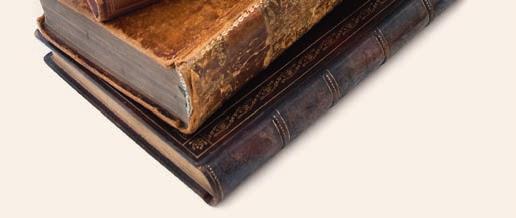











of CoreTexts andIdeas
of Core Texts and Ideas







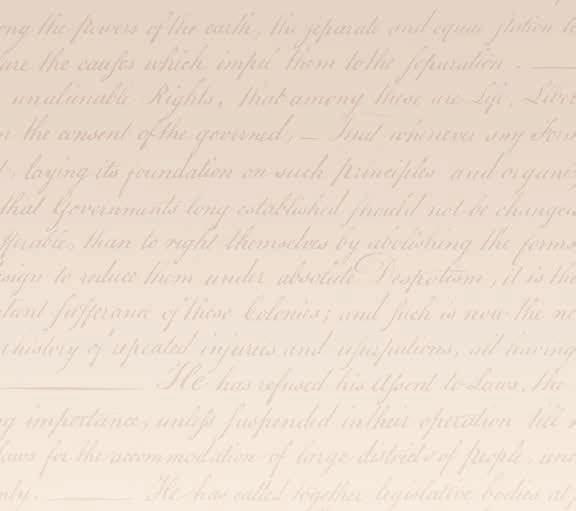


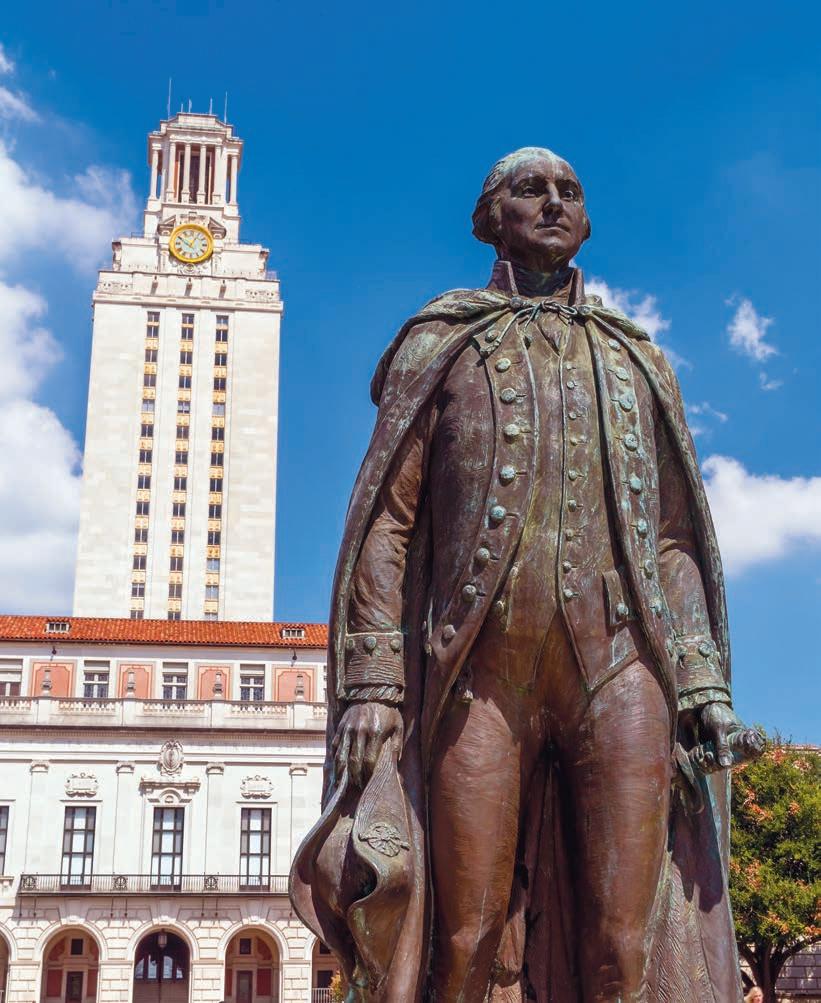
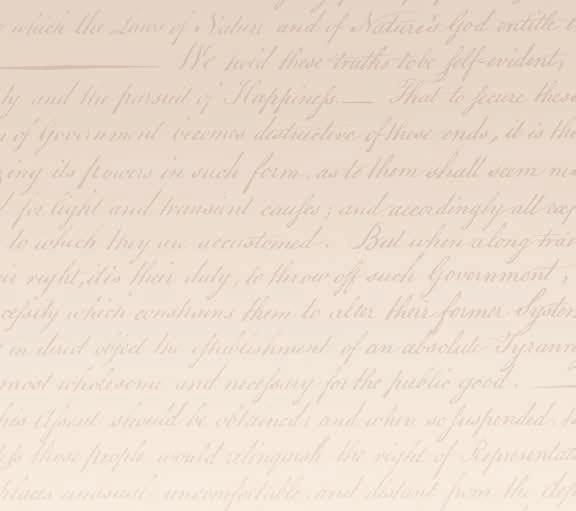

“A good book is the precious life-blood of a master spirit, embalmed and treasured up on purpose to a life beyond life. Unless wariness be used, as good almost kill a man as kill a good book: who kills a man kills a reasonable creature, God’s image; but he who destroys a good book, kills reason itself, kills the image of God, as it were, in the eye. For books are not absolutely dead things, but do contain a potency of life in them to be as active as that soul was whose progeny they are; nay, they do preserve as in a vial the purest e cacy and extraction of that living intellect that bred them.”



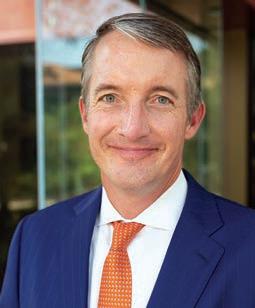
“ e omas Je erson Center’s mission re ects the core values and purpose of our university as a whole. By studying the most important texts in human history, our students and faculty illuminate our past, examine old ideas through the lens of the present day, and nd fresh inspiration for our future. One of the greatest gi s we can give our students is true understanding—not of what to think, but of how to think. By immersing themselves in these core texts, UT students strengthen their intellectual powers and deepen their abilities on a fundamental level, carrying new skills and lessons with them throughout their academic careers and into their lives a er graduation.”
“I must judge for myself; but how can I judge, how can any man judge, unless his mind has been opened and enlarged by reading?”
—John Adams, Diary

“As we enter the third decade of the 21st century, our ability to understand complex ideas and issues in the context of human history has never been more important. Advances in communications technology have brought distant corners of the world much closer together, but have also served to divide us in many ways. rough both broad and deep study of history’s major creative and theoretical works, the omas Je erson Center unites students and faculty from across campus in a mutual endeavor to be er understand the human condition, appreciate the diverse world of ideas, and learn how to critically and ethically apply this knowledge to the be erment of our civic life.”
“Reading in company with my friends, I go through the treasures of the wise men of old which they wrote and le behind in their books; and if we see something good, we pick it out; and we hold that it is a great gain if we become friends to one another.”
—Socrates, in Xenophon’s Memorabilia
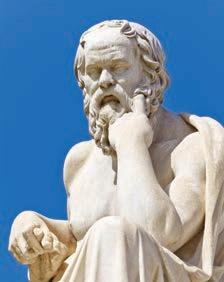






“Fix reason rmly in her seat, and call to her tribunal every fact, every opinion.”
—Thomas Jefferson


The aim of the Thomas Jefferson Center is to realize Jefferson’s vision of educating citizens and leaders to understand the meaning of liberty and to exercise it wisely. We share Jefferson’s conviction that one of the best ways to attain a liberal education—an education suited for a free individual in a free society—is through a serious study of the great books.
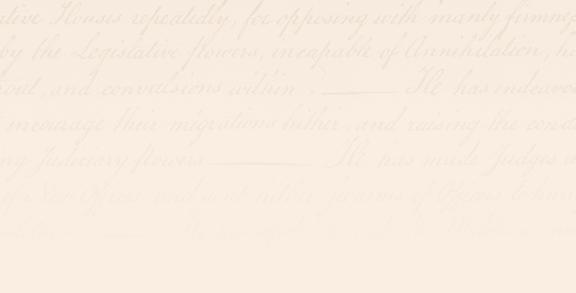
We offer for students in all colleges the Certificate program in Core Texts and Ideas (CTI). The program includes courses in ancient philosophy and literature, basic texts of world religions, works in the history of political philosophy, and key texts articulating the principles of the American founding and their subsequent historical unfolding.


When students join the Jefferson Center’s community of scholars, drawn from many departments and schools of thought, they begin a probing and critical study of the major creative and theoretical works that have shaped human thought and history. They enter into great historic debates about human nature, ethics and the meaning of life. In the process, they learn the skills of critical reasoning, close reading, clear cogent writing and civil debate.








“My experience with the Je erson Center started in high school—Founders Classical Academy in Leander. My literature teacher and later senior thesis advisor was an alumnus of the program. In addition, a graduate student from the Je erson Center taught both my senior government and philosophy class. I got a glimpse of the great books program at UT from the way these two teachers taught their classes and thought about the most serious questions concerning the human condition. Now I am a student at the Center, learning to think more deeply and carefully about those same questions.”
—Mary Carmen Cid, European Thought and Government Major



Tom Pangle holds the Joe R. Long Chair in Democratic Studies in the Department of Government. He has won Guggenheim and four National Endowment for the Humanities fellowships, and has been awarded the Robert Foster Cherry Great Teacher of the World Prize from Baylor University. He is a lifetime Fellow of the Royal Society of Canada.
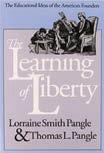
Lorraine Pangle is Professor in the Department of Government, where she teaches political philosophy. She has won the Raymond Dickson Endowed Teaching Fellowship at UT as well as fellowships from the Searle, Olin, and Earhart Foundations, the Social Sciences and Humanities Research Council of Canada, and the National Endowment for the Humanities. With omas Pangle she is co-author of e Learning of Liberty: e Educational Ideas of the American Founders (Univ. Press of Kansas, 1993).
Her other publications include Reason and Character: e Moral Foundations of Aristotelian Political Philosophy (Chicago, 2020); Virtue is Knowledge: e Moral Foundations of Socratic Political Philosophy (Chicago, 2014); e Political Philosophy of Benjamin Franklin (Johns Hopkins, 2007); Aristotle and the Philosophy of Friendship (Cambridge, 2003); and articles on Plato, Aristotle, Xenophon, the American founders, and the philosophy of education.
Among his publications are Montesquieu’s Philosophy of Liberalism (Chicago, 1973); e Spirit of Modern Republicanism: e Moral Vision of the American Founders and the Philosophy of Locke (Chicago, 1988); e Ennobling of Democracy: e Challenge of the Postmodern Age (Johns Hopkins, 1992); Justice Among Nations: On the Moral Basis of Power and Peace, co-authored with Peter J. Ahrensdorf (Kansas, 1999); e eological Basis of Liberal Modernity in Montesquieu’s Spirit of the Laws (Chicago, 2010); Aristotle’s Teaching in the Politics (Chicago, 2013); e Socratic Way of Life: Xenophon’s “Memorabilia” (Chicago, 2018); and Socratic Founding Political Philosophy in Xenophon’s “Economist,” “Symposium,” and “Apology” (Chicago, 2020). His DVD and audiotape lecture course, “ e Great Debate: Advocates and Opponents of the American Constitution,” is marketed by e Teaching Company in its Great Courses series.
Erik Dempsey is a Lecturer in the Je erson Center, the Department of Government, and the Department of Classics. He has a doctorate in Political Science from Boston College, specializing in the ethical and political thought of Aristotle. He has taught classes for CTI on the history of political philosophy, the American founding, Shakespeare’s politics, and a class called Jerusalem and Athens comparing the politics of the Hebrew Bible and the ancient Greeks. He is a 2016 recipient of the Raymond Dickson Endowed Teaching Fellowship.












The certi cate program in Core Texts and Ideas (CTI), open to students in all undergraduate colleges of the university, complements any major. It provides a path through UT’s core curriculum requirements by a study of the great books. Students take an integrated, interdisciplinary sequence of six courses on great works of philosophy, literature, science, and the arts. Emphasizing debates about fundamental questions of enduring human concern, the program provides a grounding in the major ideas that have shaped the Western world and the democratic principles of the United States. Students engage in a sympathetic but critical study of the great authors’ competing teachings on human nature and the good life. As a result, skeptics and believers, liberals and conservatives, humanists and scientists become more re ective about their own beliefs, more capacious in their sympathies, and be er prepared to engage in civil and respectful dialogue with people of di erent ways of thinking. Students emerge from the program be er prepared to live thoughtful, serious lives, both as citizens and as human beings















Students in the certi cate program take courses in four required areas and two elective areas.
e rst required course introduces students to selected masterpieces from ancient Greece, the cradle of both republican self-government and the daring and unprecedented enterprises of science and philosophy. Common elements in this course are at least one work of classical epic or tragedy and at least one dialogue of Plato.
“I have loved studying the ancients with CTI. It has allowed me to explore a new outlook on law, politics, and an individual’s relationship to society, and to see why their lives and ideas still mean so much to us today.”
—Alexandra Elizondo, Classics Major



“I enjoyed the small group se ing and open conversation in the Bible and Its Interpreters class because it fostered natural dialogue about the major thematic and historical elements of biblical texts and related works. By asking questions, listening to the input of my classmates, and engaging in healthy disagreements during and outside class, I am much be er equipped in my personal study of the Hebrew Bible, New Testament, and other great books.”
—Melanie Milligan, Business Major

e second required course is an introduction to the Hebrew Bible, the New Testament, and other major religious texts. Students re ect on the fundamental ethical and theological teachings of the texts and the di erent ways the texts have been interpreted and applied by the authors and the communities they have inspired.
e third required course explores the ongoing dialogue in Western thought about rights, political legitimacy, and the proper functions and limits of government. Students study the works of revolutionary thinkers in the history of political philosophy and come to understand the ways that these thinkers have shaped the world we live in. Common texts for this course


include Aristotle’s Nicomachean Ethics and Politics; omas Aquinas’ political writings; at least one foundational text of modern liberalism, such as Locke’s Second Treatise of Government; and the writings of at least one modern critic of liberal enlightenment principles, such as Rousseau or Nietzsche.
e fourth required course explores America’s grounding constitutional principles. Common readings for this course are the Declaration of Independence, e Federalist, and Tocqueville’s Democracy in America. Other readings may include writings by the Puritans, Franklin, Je erson, Madison, Washington, the anti-Federalists, and major African-American writers; presidential speeches; and Supreme Court cases.
Students choose two electives from among the dozens we o er each semester, such as: Einstein in an Age of Con ict, Major Works of Dostoevsky, Confucianism, Dante, e Qur’an, Darwin and the Politics of Evolution, Origins of Liberalism, e Structure of Individual Liberties, and many others.
“Classics of Social and Political ought challenged many of my own preconceived notions. It is probably the main reason that I am now studying philosophy. rough discussion and debate, my classmates and I thought through issues like free will, morality, and love in a more nuanced way than we had before. From Plato to Richard Dawkins, we gained an overview of intellectual history in a way that helped us reconsider our own beliefs and ideas.”
—Ramiro de los Santos, European Thought Major








The Je erson Scholars program is an integrated learning community for talented students interested in pursuing the Certi cate Program in Core Texts and Ideas. Students who have been accepted to UT in all colleges can apply to this selective program during the spring semester before they matriculate, and most complete the Certi cate Program during their freshman and sophomore years. To give the scholars the experience of a small liberal arts college within a great research university, the courses are kept small—most are seminars of 25 students or less—and are supplemented by a rich array of extracurricular events for the Scholars, including hikes, study breaks, cultural events, lectures, and lunches with professors who are teaching in the program.


David: Sinner or Saint?
A panel discussion among faculty in the Departments of Middle Eastern and Religious Studies

As part of the Je erson Scholars program, the Center sponsors a series of lunchtime lectures. University faculty and outside speakers give presentations on topics of special interest to them related to the great books. We also host panel discussions, which give students the opportunity to see faculty engage with one another. Past examples include:

Alfarabi on the ‘Virtue of Struggle’ in Islamic Law
By Ahmed Siddiqi, Emory University
Homer’s Political ought
By Sotirios Barber, University of Notre Dame
Freedom is Hard to Bear: Concepts of Liberty in James Baldwin’s ‘Down at the Cross’
By Nicholas Buccola, Lin eld College
“ e Je erson Scholars Program has been the most in uential part of my college career. In this program I found professors that care about me individually, challenging course work that t my interests, and peers who share the same passion for learning as I do. My favorite course has been GOV 312P because of the appreciation it gave me for carefully reading e Federalist. I ended up so interested in the material that I wrote a research paper on the role of Roman political thought in the Founding era, and was able to present it at a national conference.”
—Sydney Smith, Psychology and Government Major




“ e Je erson Scholars Program has given me that small and tight-knit community that one needs while a ending a large university, where the community is both like-minded and diverse. Everyone is willing to understand the world beyond its surface, ask di cult questions, and open to new perspectives, but in they have di erent backgrounds, ambitions, and interests. It’s an amazing community.”
—Harika Kollipara, International Relations and Global Studies Major


Freshmen Je erson Scholars are paired with upperclassmen who serve as their peer mentors. e mentors o er support and guidance as students learn their way around the University, and they help build a community among students from all years.
Each year one of our science majors serves as leader for a Jefferson Scholars Freshman Interest Groups organized by the College of Natural Sciences; one serves as resident assistant in our Living Learning Community (see p. 10), and all of them organize activities and outings for groups of Je erson Scholars throughout the year. Many of our most enthusiastic peer mentors are sophomores who especially appreciated having a mentor in their freshman year.
Je erson Scholars and their peer mentors have access to a student activity fund to defray the cost of outings to plays, operas, classical music concerts,
museum exhibits, and other cultural events on and o campus, further fostering a tight-knit community of learners who enjoy conversations about books and ideas.
With support from our generous donors, each year the Center gives book prizes to twenty or more top Je erson Scholars. ese prizes allow students to begin building their own personal libraries of great books and encourage habits of lifetime reading.








“A er taking some Je erson Center classes, I was inspired to pursue a major in European ought. I had never before studied the great thinkers of the past in a way that made them come alive. During my senior year, I wrote a thesis comparing Aristotle and Nietzsche’s conceptions of happiness, and now I am pursuing a doctorate in political philosophy. e education I got through the program gave my life a new and be er direction.”
—Tarek Zaher


One of the most popular activities of the Je erson Scholars Program is its take-your-professor-to-lunch program. Each semester the students choose several professors that they would especially like to get to know and invite them to lunch. In small groups at the faculty club, they can then enjoy an hour’s conversation about the books and ideas that have inspired some of UT’s leading scholars.

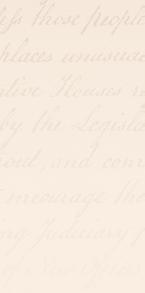





e Je erson Scholars Living Learning Community (LLC) provides an immersive experience for freshman Je erson Scholars who wish to live in a close-knit community with others in the program. It is located in the Moore-Hill Residence Hall in the central part of campus, near the Perry-Castañeda Library, the liberal arts quad, and Gregory Gymnasium. In the LLC, students who share a love of the great books and an interest in the great questions of human life are able to continue their conversations outside of class. ey enjoy shared meals, form study groups, and welcome faculty members to the dorm for informal discussions throughout the year.
“As a rst year student at UT, it is easy to get lost in the crowd, but the Je erson Scholars program and LLC provided me an on-campus family. is program holds professors who are passionate about their subjects and dedicated to each student’s success, and students who are eager to question the assumptions many people hold. e LLC encourages discussion and debate about subjects in a way that bleeds out of class time and helps us form strong, lasting friendships based on our shared concerns. Joining the Je erson Scholars program and the LLC was one of the best decisions I made as an incoming freshman.”
—Alyssa Caver, International Relations and Global Studies Major

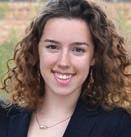






In addition to funding small seminar sections of courses for the Je erson Scholars, the Center also provides voluntary small discussion sections for all the large lecture courses in its Core Texts and Ideas program. Here students can engage in lively debate about the ideas they encounter in the great books and get tutoring to improve their writing and study skills.
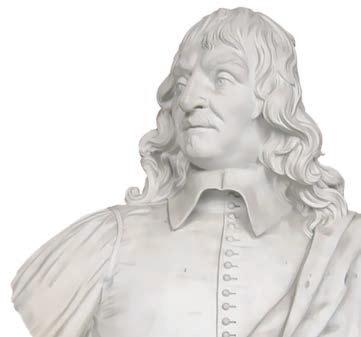
e Je erson Center provides small grants for faculty members to develop new courses on the great books or to integrate more readings from major primary sources into existing courses. Courses that have been developed in this way include History of the American Presidency, Debating the Bible, e Poetry of John Milton, Italian Masterpieces, and a new version of America’s Constitutional Principles with an extended unit on African-American political thought.



e Je erson Center regularly o ers Teaching Fellowships to dynamic young scholars chosen competitively from across the country who have recently completed doctoral dissertations on the great books, in all areas of the liberal arts. Fellows teach one course each semester in our interdisciplinary undergraduate program, making a crucial contribution to elding our four required Certi cate courses. e fellows are also given time to revise their dissertations for publication.





courses in its Core Texts and Ideas program. Here stue to for




Contributions to the Instructional Fund support the courses taught in the Je erson center by our post-doctoral fellows and lecturers, as well as small discussion sections in our lecture courses.
“ e JMC has been a proud partner and supporter of the Je erson Center since its inception. In a short time, the Center has become a national leader for providing an excellent education in the principles of the American Founding and essential core texts while reaching students in diverse career paths. Its innovations have become a model for similar programs on campuses around the country.”
—Michael Andrews, President, The Jack Miller Center






The student book club is an extracurricular forum in which undergraduates, graduate students, and professors meet to discuss short selections from great books and great authors, selected by students in collaboration with the faculty. e club is one of several initiatives that extend the impact of the Center beyond the classroom, thus building a lively intellectual community around conversation and debate on the most important issues.



e club gives students an informal venue in which to share and re ne their ideas, and in which their love of the great texts can ourish. It is not uncommon to see members of the book club in the student lounge discussing what they’ve read, long a er the o cial reading group has ended. During the summer, the club meets every week, giving students who are in Austin the opportunity to continue their education even when classes are out.
• Abraham Lincoln, selected writings and speeches
• Ibn Tufayl, Hayy Ibn Yacqzan
• Jane Austen, Sense and Sensibility
• Poetry of Elizabeth Carter, omas Gray, and Samuel Johnson
• Adam Smith, eory of Moral Sentiments
• Plato, Phaedrus
• Montaigne, “Of Friendship”
• Poems of Sappho



Distinguished scholars who are eloquent speakers, from the University of Texas and from around the country, deliver campus talks on great books and abiding themes. e lectures are open to the public. Some are recorded, and are available in DVD and CD format through our website.
As part of the series, the Je erson Center is responsible for Constitution Day programming for the University. All colleges and universities which receive federal funding are required to host an academic program pertaining to the Constitution every year on or near Constitution Day, September 17. e Je erson Center sponsors a lecture each year.


“ e book club has been one of my best experiences as an undergraduate. We approach texts in a less formal se ing, but still with rigor. We have the opportunity to explore works and ideas that don’t come up directly in our classes, enabling us to explore new questions together and to learn from each other’s perspectives. It’s almost like having an extra class, where we can choose for ourselves what we do.”


—Kelsi
Cox, Neuroscience and Government Major






For centuries, a journey through Italy was thought of as a natural complement to a liberal education. Revisiting the ancient, medieval, and renaissance art and architecture o ered to youth a sense of the depth and the grandeur of the past that was being eclipsed by the more fair-minded, but smaller world of egalitarian modernity. Both its ruins and its life made Italy a privileged vantage point om which to contemplate the virtues and the vices of the modern world. Modern thinkers of no less stature than Goethe, Shelley, Keats, Byron, Stendhal, Burckhardt, Wagner, George Eliot, Henry James, Nietzsche, Mann, Joyce, Pound, and T.S. Eliot all found study in Italy congenial to their spirits and essential to their work
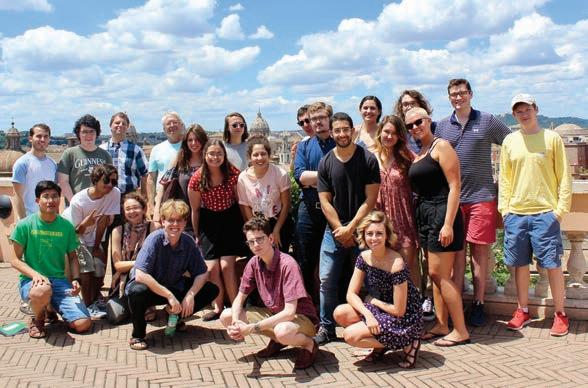
e Rome Institute of Liberal Arts o ers undergraduate interdisciplinary courses on the great books while exploring the art and architecture of Rome. Discussion-based classes on philosophy, literature, and history are combined with excursions through Italy’s artistic heritage, led by art historians and classicists. University of Texas students can receive course credit and satisfy their university ne arts requirement through these summer courses. More information on RILA may be found at that program’s website, www.rilarts.org.
“RILA was an incredible experience. Rome is the perfect place to study the great books. It was amazing to learn about events from the city’s ancient past and then walk just a few minutes to the spot where they occurred. I also came to appreciate classical art and architecture by exploring the city’s vast collection. On the whole, studying at RILA was one of the most illuminating and best experiences of my undergraduate career.”
—Ian Myers







In collaboration with the Center for European Studies, the Je erson Center has developed a major in European ought, focusing on core texts from the European tradition. Students read great works in philosophy and literature, and explore the deepest roots of the Western intellectual tradition.

In Spring 2019, the Je erson Center launched its Alumni Association. Upon graduation, those who have completed the Certi cate in Core Texts and Ideas are automatically enrolled. e mission of the Association is to foster a community among our alumni and to advocate for the distinctive educational vision that the Je erson Center represents. It also lets alumni network professionally with one another, and gives them a way to support the Center as they advance in their lives and careers.

Joey Sorenson, one of the rst graduates from the Je erson Scholars program, currently serves as president. He may be contacted at josephssorenson@gmail.com.


























“ e Je erson Scholars program was, without a doubt, one of the most profoundly impactful experiences of my time on the Forty Acres. I was encouraged to think critically and discuss freely among my peers some of the issues at the very heart of what it is to be human: freedom, equality, love, war, truth, beauty, and many other similarly stirring subjects. e critical thinking and persuasive speaking abilities honed in my Core Texts classes have served me well in my post-graduate professional pursuits, and my studies in the program have contributed enormously to my enjoyment and ful llment in life generally, as well as my understanding of myself and of my fellow human beings. I cannot recommend this program highly enough.”


— Joey Sorenson, Alumni Association President








And yet the books will be there on the shelves, separate beings, at appeared once, still wet
As shining chestnuts under a tree in autumn, And, touched, coddled, began to live


In spite of res on the horizon, castles blown up, Tribes on the march, planets in motion.
“We are,” they said, even as their pages Were being torn out, or a buzzing ame
Licked away their le ers. So much more durable an we are, whose frail warmth
Cools down with memory, disperses, perishes.
I imagine the earth when I am no more:
Nothing happens, no loss, it’s still a strange pageant, Women’s dresses, dewy lilacs, a song in the valley.
Yet the books will be there on the shelves, well born, Derived from people, but also from radiance, heights.



— Czeslaw Milosz

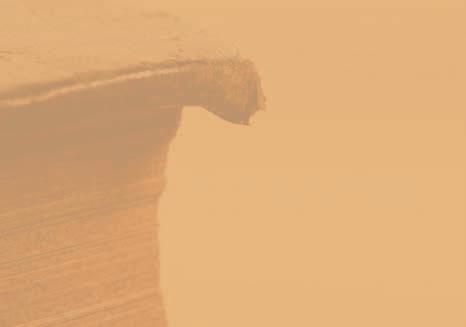

www.utexas.edu/cola/centers/coretexts/

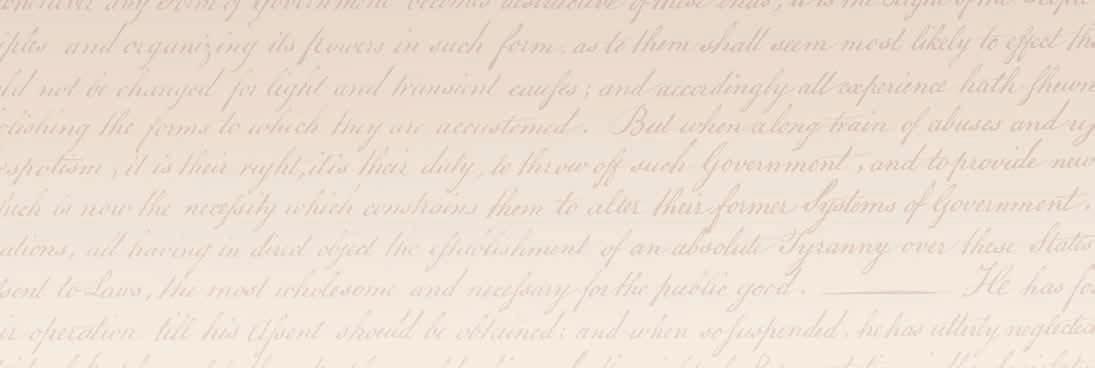
“I look to the di usion of light and education as the resource most to be relied on for ameliorating the condition, promoting the virtue, and advancing the happiness of man.”
—Thomas Jefferson

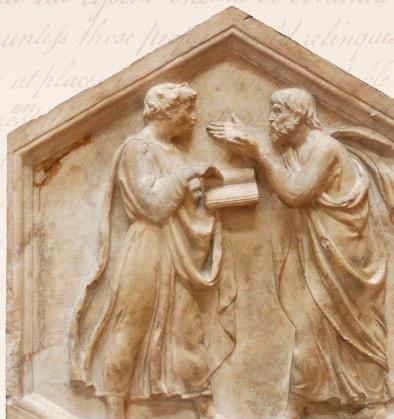
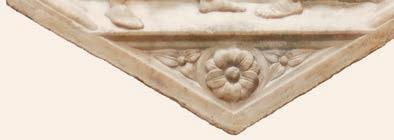

Contact Us
omas Je erson Center







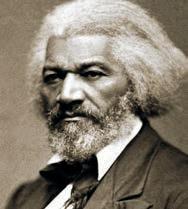

For the Study of Core Texts and Ideas
e University of Texas at Austin 158 W 21st St, Stop A1800, Austin, TX 78712
Lorraine Pangle, Co -Director: lorrainepangle@austin.utexas.edu
omas Pangle, Co-Director: tpangle@austin.utexas.edu
Justin Michalka , College of Liberal Arts, Development O ce: jmichalka@austin.utexas.edu or (512) 232-8143
For More Information:
Phone: 512-471-6648
Website: www.utexas.edu/cola/centers/coretexts
Email: cti@austin.utexas.edu

